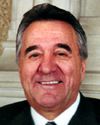Madam Speaker, I wish I could tell you, but I do not know who it would be. So, I guess I will not be sharing my time, if that is possible.
There is something that is puzzling me today. How is it that the Bloc Quebecois on the other side is not telling Quebecers what this bill is really about? This bill serves two purposes. Where minor offences are concerned, the emphasis is put on community services instead of custody. That is easy to understand. Why send to prison first time offenders? In the case of more serious offences, three changes are being made. First, there is a change of courts. Young persons will remain in the youth court system. They will no longer be transferred to adult courts.
It is important to mention that Quebec, where supposedly all is well for youth, presently has the highest rate of transfers to adult courts. This is a sad record. We and Manitoba have the same number of cases referred to adult courts. Why so many transfers? We must make sure that young people are protected and stay within a system adapted to their needs.
This is the reason why I welcome with great enthusiasm the amendment contained in the bill on the youth criminal justice system, which will allow to keep young people before youth courts.
The other proposed change is to lower from 16 to 14 the age at which a young offender could be sentenced as an adult.
At present, we know that if a youth commits a serious offence, the onus is on him to show that he should be allowed to remain before the youth court. With the new bill, this situation changes. The age limit will be lowered to 14 years, although under clause 61, a province which wishes to maintain the age limit at 16 will be allowed to do so. Again, the Quebec system remains unchanged, since the age limit remains at 16 in Quebec. It will be up to the government of Quebec to keep the age limit at 16.
Another major change in the bill has to do with the location where young people would serve their sentence. It will necessarily be a correctional facility for youth. This rule applies in all cases, the only exception being when the judge passes the sentence on the basis of the evidence submitted. He or she could decide, depending on the seriousness of the offence, that putting this young offender in a youth facility could indeed be detrimental to the other offenders held in that facility. It is the only instance, and it will be up to the judge to decide.
This is what this bill is all about, which is why I fail to understand why there is such strong opposition to this bill. A rather surprising misinformation campaign is going on right now in Quebec. Unfortunately, certain statements made by members of the Bloc Quebecois are a great disservice to the people of Quebec. I think the position of our opponents on the other side of the House, of our friends should I say, is simply unacceptable. They believe that putting a young teenager who has committed a first minor offence in a youth detention centre is better than any kind of action by the parents, the community or a crime prevention organization, and it is simply unacceptable.
I do not understand that position and it worries me. For example, does the member for Berthier—Montcalm, the Bloc Quebecois' critic with regard to the youth criminal justice system, want to increase the youth incarceration rate, which is already at an unacceptable level? Right now, Canada's youth incarceration rate is the highest in the western world. It is higher than that of the United States.
For example, in 1997 the United States put 775 young offenders between the ages of 12 and 17 behind bars, compared to 1,046 for Canada. These numbers are based on proportional calculations, of course.
It is disturbing, and all the more so because recently in Quebec four reliable people mandated to investigate issues of access to residential services and administrative and financial problems of youth centres in Montreal found that these centres were poorly managed. When there is bad management, mistakes and negligence are a risk.
What if some young people are forgotten in these rehabilitation centres where they should get rehabilitation programs? This could happen if the management is deficient. It is not right to give the priority to structure.
As a government, our responsibility is to make sure young people in trouble grow to be responsible citizens in our society. I do not think sending them to youth court is the best way, when alternative measures are available.
I am a lawyer. A few years ago, I worked in a youth court. I saw parents who were desperate and had to appear as witnesses in the case of their child. Too many young people have paid dearly for small offences and will have a criminal record for the rest of their life.
I have to admit I am a bit ashamed of being a Quebecer when I hear another Quebecer opposite try to confuse the issues on a bill as important as this one for the future of young people.
I believe that this bill on the criminal justice system, and let us say this once and for all, offers a flexibility that will enable Quebec to continue its good work if it so wishes. It contains precise principles which will guide the youth court judges. Access to extraordinary measures was mentioned in the Young Offenders Act when it was passed in 1986, but now these are specified, and the judge has the opportunity to use new measures. This is important.
There is the possibility of reprimands, orders for support and intensive supervision. There is the possibility of orders to submit to approved programs and of custody and supervision orders. There is the provision of programs, when the youth is in detention, to monitor him once he has returned to the community.
These new sentences will be to the young offender's advantage, since they will provide the courts with alternative measures proportional with each adolescent's offence and situation. The new bill sets out clear restrictions on custody.
It must also be pointed out that the bill limits the use of custody to crimes involving violence, repeat offenders who have not complied with previous sentences, who have already reoffended and who have been sentenced for a serious offence. It also limits custody to exceptional circumstances. It troubles me greatly to learn that this bill has been so misunderstood in Quebec.
In closing, I also find it regrettable that a young actor has been used to promote a misinformation campaign. I believe that confusion is still being spread throughout the public. Unfortunately, I cannot accept such a situation.
I take this opportunity to invite all hon. members who require information on this bill to contact us on this side of the House, and we will be pleased to explain that this bill is not what they are trying to make them believe it is. It proposes some innovative solutions to help our young people become the responsible citizens and adults of tomorrow.













